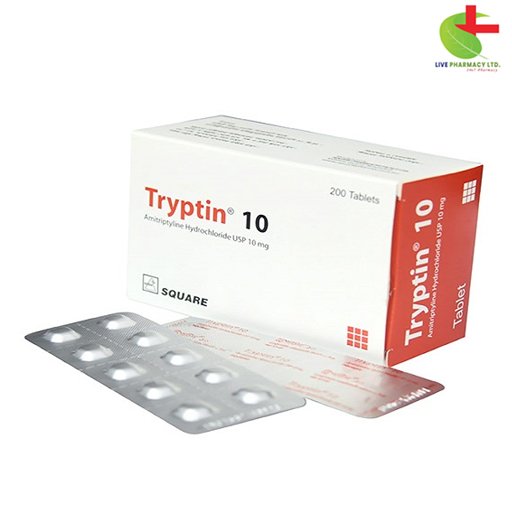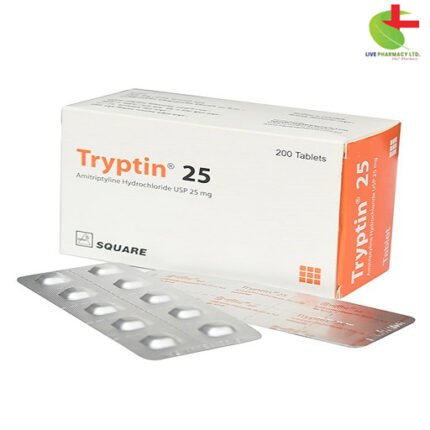Tryptin 10
8.50৳ Strip
- Tryptin is a tricyclic antidepressant utilized for various conditions:
- Depressive illness, particularly when sedation is needed.
- Nocturnal enuresis in children.
- Prophylaxis of migraines.
- Alleviation of tension headaches.
- Management of chronic pain.
- It possesses notable anticholinergic and sedative properties, functioning by inhibiting the reuptake of noradrenaline and serotonin.
- Dosage and administration are tailored to each condition, with careful attention to potential interactions and contraindications.
- Storage instructions advise keeping Tryptin in a cool, dry place, away from light and moisture.
 Brand
Brand
|
Square Pharmaceuticals PLC |
|---|---|
 Generics
Generics
|
Amitriptyline Hydrochloride |
Indications
Tryptin serves various purposes, including:
- Treating depressive illness, especially when sedation is necessary.
- Managing nocturnal enuresis in children.
- Preventing migraines.
- Alleviating tension headaches.
- Addressing chronic pain.
Description
Tryptin is classified as a tricyclic antidepressant with notable anticholinergic and sedative traits. Its mechanism involves hindering the reuptake of noradrenaline and serotonin at nerve endings. Upon ingestion, it is swiftly absorbed by the gastrointestinal tract, reaching peak plasma concentrations within 2-12 hours. Tryptin is primarily excreted through urine, predominantly in metabolized forms.
Pharmacology
While the exact mechanism remains incompletely understood, it is suggested that amitriptyline, the active ingredient in Tryptin, inhibits the membrane pump mechanism responsible for the reuptake of neurotransmitter amines like norepinephrine and serotonin. This action potentially elevates their concentrations at synaptic clefts in the brain, crucial for mood regulation. Tryptin may counteract deficiencies of serotonin and/or norepinephrine neurotransmission implicated in depression. Its precise analgesic effects, whether tied to mood alteration or another pharmacological action, remain uncertain.
Dosage & Administration
For depression, initiate with 75 mg daily (30-75 mg for elderly and adolescents), divided doses, or as a single bedtime dose, gradually increasing to 150-200 mg as needed. Not recommended for children under 16 years for depression. For nocturnal enuresis: 7-10 years: 10-20 mg, 11-16 years: 25-50 mg at night; treatment duration (including gradual withdrawal) should not exceed 3 months; full physical examination before continuing. For migraine prophylaxis: 100 mg daily. For tension headache: 10-25 mg three times daily.
- Use medication as per physician’s advice.
Interaction
Tricyclic antidepressants (TCAs) potentiate the sedative effects of alcohol and opioid analgesics. Concurrent use of TCA with Moxifloxacin or Terfenadine heightens the risk of ventricular arrhythmias. Disulfiram and Cimetidine inhibit Tryptin metabolism. Combining TCA with diuretics increases the risk of postural hypotension.
Contraindications
Amitriptyline is contraindicated in myocardial infarction, arrhythmias (particularly heart block), mania, and severe liver disease. Initial sedation may impair driving or operating machinery.
Side Effects
Common side effects encompass anticholinergic symptoms such as excessive perspiration, dry mouth, blurred vision, hyperpyrexia, urinary retention, and dilatation of the urinary tract. Cardiovascular reactions may include hypotension, syncope, postural hypotension, hypertension, tachycardia, palpitations, and myocardial infarction. CNS and neuromuscular effects consist of confusion, impaired concentration, disorientation, and delusions. Allergic reactions, hematological effects, gastrointestinal disturbances, and endocrine anomalies may also occur.
Pregnancy & Lactation
Amitriptyline falls under Pregnancy Category C, crossing the placenta. Its use during pregnancy should be carefully weighed against potential fetal risks. It is excreted into breast milk, necessitating a decision between discontinuing nursing or the drug, considering its importance to the mother.
Precautions & Warnings
Exercise caution in patients with a history of epilepsy, glaucoma, urinary retention, cardiac disease, diabetes, pregnancy, hepatic impairment, thyroid disease, increased intraocular pressure, and psychoses, as Tryptin may exacerbate mania.
Therapeutic Class
Tricyclic antidepressant
Storage Conditions
Keep Tryptin in a cool, dry place below 30°C, shielding it from light and moisture.













Reviews
There are no reviews yet.